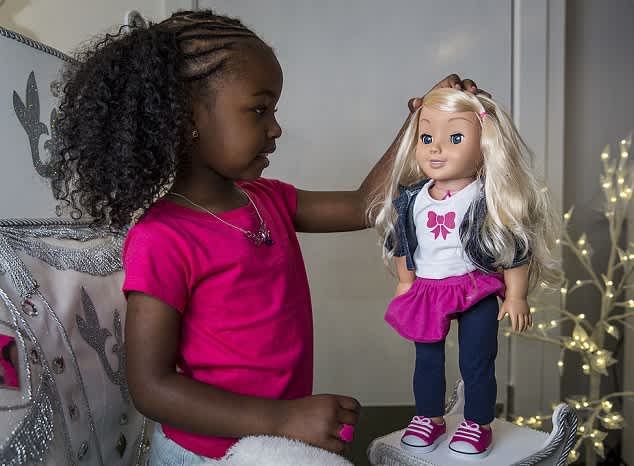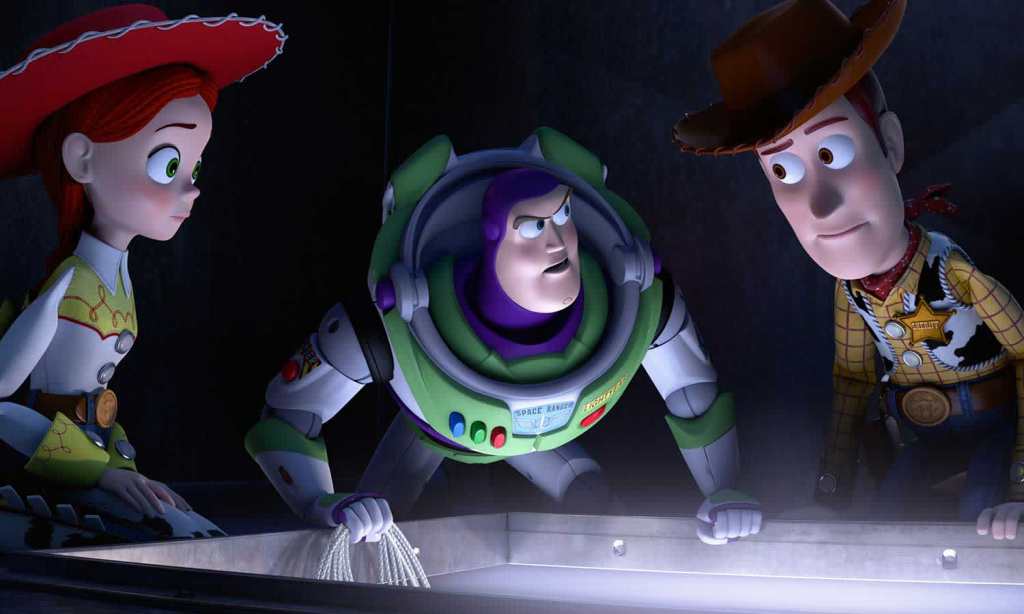Elf on the Shelf, the covert agent of Santa that duplicitous parents keep around their home to “spy” on their children and blackmail them into being good all year lest the big man in the red suit finds out, might just become a reality.
Unfortunately, it won’t be an Antarctic cabin-dweller with an army of enslaved sweatshop elves receiving the news, it will be multi-national corporations selling children’s toys.
Reports from the US, the land of dystopic trials pre-international rollout, suggest that toy companies like Mattel and Genesis Toys are already experimenting with AI technology in their dolls and action figures. This trend is only likely to continue as technology develops.
One expert has said that in 15 years time, the AI in children’s toys will likely be smarter than the parents — unless laws are put in place now to stop this real-life Chucky situation from emerging.
Smart toys
The prefix ‘smart’ is applied to everything these days. It doesn’t always suggest that the technology in question is actually any better, but the price tag will be higher.
My Friend Cayla was a line of dolls sold by Genesis Toys that could interact with and talk to children. It used voice recognition technology and would search the internet for definitions of what a child had said, responding back to it in real-time.
The dolls sold in 2014 were named Innovative Toy of the Year by the London Toy Industry Association. They became a top 10 toy for European retailers.

Unfortunately, the dolls were also recording everything that was said around them and proved relatively easy to hack into.
German authorities soon instructed parents to “destroy” the dolls, as they posed a security risk for families and the company stopped selling them in 2017.
In the US, Mattel’s Hello Barbie dolls used similar technology to learn about children, developing a profile for them in order to create better conversations in the future.
Released in 2015, the public outcry over a children’s toy that records information on kids led to a social media campaign using the hashtag #HellNoBarbie. The doll was soon removed from shelves.
That was six years ago, however, and technology has progressed significantly since then. AI and smart technology in kids toys continues to be used and will likely become a key part of how children learn and develop. Better get them used to the surveillance state soon.
Richard Gottlieb, CEO of Global Toy Experts, a toy industry consultancy firm has said that there is no doubt that “the world these children are going to live in is going to be a world that’s enhanced by artificial intelligence,” said
“Artificial intelligence is extremely important to society, whether we like it or not,” he said.
The market for smart toys is rapidly expanding and could grow to $18 billion by 2023.
While most of these toys offer the opportunity to help children learn, they pose significant risks if they are not designed with children’s data privacy and safety in mind.
Smart toys use artificial intelligence to collect data on children. Whether that’s for something as innocent as learning their favourite ice-cream flavour, or teaching them how to identify shapes, data collection is set to be a core part of the next generation of kids toys.
Seth Bergeson, Project Fellow at the Centre for the Fourth Industrial Revolution, and Kay Firth-Butterfield, Head of Artificial Intelligence and Machine Learning at the World Economic Forum have written on the Black Mirror-esque dangers of AI technology in kids toys.
They argue that if designed properly and with the correct oversights, smart children’s toys could become incredible resources for kids.
However, if we don’t take the proper precautions, they could become surveillance tools used to record your child’s every move and every word, along with everything done and said around them.
Uh, shouldn’t someone be doing something about this?
Well, there are certainly concerns being raised in the right areas.
Will.i.am — yes, that’s right — was chair of the World Economic Forum’s first annual Smart Toy Awards’ judging committee and spoke about his fears for the future at the event.
“These toys are not just toys. They’re smart and they’ll be getting smarter,” he said.
“We need to demand safety for a kid. A toy that is aggregating that data of your child should not be used against that child when the child gets older”
“We’ve never been here before. As an AI toy starts to learn the child, this means the toy in the next 15 years will be smarter than the parent and gather all this data that could one day hurt the child.”
AI toys are a great opportunity for child development but can also risk privacy and safety.
Today, I'm helping to judge @wef’s #SmartToyAwards. Together, we can ensure children enjoy all the benefits of smart toys while staying safe. #ResponsibleAI https://t.co/A8FBZJWXvA
— Catherine Russell (@unicefchief) May 22, 2021
The WEF’s Smart Toy Awards selected eight winners for their inaugural prizes, going to companies like LEGO, Ryobi, and LuxAI.
The toys were judged based on their ability to protect data, use AI safely and transparently, promote healthy play, and their accessibility.
The WEF is looking to set the standard for children’s toys by awarding prizes to toys that fit these criteria and guide toymakers in the right direction.
However, commercial awards are never going to be able to enact or enforce the stringent legal mechanisms we need to ensure that children’s toys don’t become surveillance devices.
Henrietta Fore, Executive Director of UNICEF, has emphasised that “children’s rights to protection and privacy do not stop at the digital border. They extend into it.”
Australian children need better protection
Australia already has rules in place to protect children’s personal privacy in relation to internet data but our privacy laws are notoriously weaker than other jurisdictions.
The personal information of individuals under the age of 18 is regulated by the Privacy Act of 1988 however most of our privacy laws hang on the consent of the individual to have their information collected and used.
The Privacy Act does not set a minimum age to which an individual can make decisions regarding his or her personal information. A young person is able to give consent if they have a “sufficient understanding” of what they are consenting to.
If an adult barely has the time or mental capacity to understand everything they’re consenting to online, what chance do children really stand?
Privacy experts have been raising the alarm for years that children in Australia are being “pervasively tracked” when they go online and don’t fully understand the long-term impact that this data collection might have.
The children’s advertising market is a multi-billion dollar industry and marketing companies are building profiles on their target market from a young age to better sell them products down the line.
Dylan Collins, CEO of kid-tech advertising company Super Awesome, has said that by the time a child reaches the age of 12, more than 72 million pieces of personal data have been collected about them by advertising technology designed for adults.
“This data is being captured on children who have no understanding about what they’re giving up or even that the practice is happening”.
“That can have a life-changing impact. For example, [it could] affect a credit score, school admission or job eligibility”.
Imagine the complexity of a data profile collected on a person almost from birth using information gathered from their childhood toys. Private companies trying to sell them things would certainly know much more about them than they would.
Critics of Australia’s privacy laws have said that we are falling further and further behind the rest of the world with our absence of protection for children online.
The United States does however have stronger privacy laws for children and, as this is where many of the toys are designed, this might be beneficial to us down the line.
The Children’s Online Privacy Protection Act (COPPA) protects American children aged 13 years and younger and their personal information on the internet from being taken without the express approval of their parents.
Alan Butler is the executive director at the Electronic Privacy Information Center (EPIC), a public interest research centre focused on privacy issues. He has said that the purpose of COPPA is to control data collection systems and limit their abilities to target children.
“For any new device coming onto the market, if it’s not complying with COPPA, then it’s breaking the law,” Butler said.
“There’s a lot of toys on the market and there’s a need to ensure that they’re all complying with COPPA.”
The US is still grappling with these issues and ensuring regulatory compliance is difficult. Australia however is still very much stuck in the ’90s when it comes to data collection online, particularly for young people.
Smart tech will do doubt be a huge benefit to children through adaptive learning and educational practices.
If it’s not done right though, it could accelerate our descent into a surveillance-capitalist dystopia where companies understand our wants, fears, and desires much better than we ourselves do and use that information to — at a minimum — sell us things we probably don’t need.
Let’s hope we get on top of the tech before it gets on top of us.
Read more stories from The Latch and subscribe to our email newsletter.







